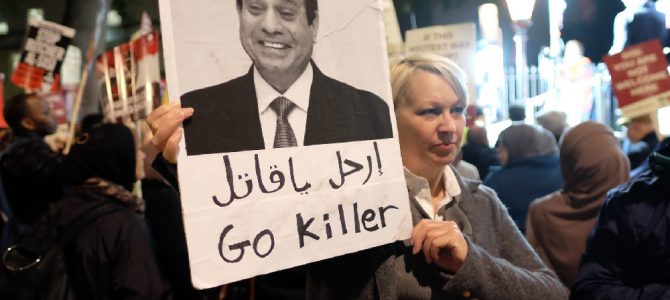
Sometimes it all comes together for President Trump’s critics. The administration’s warm welcome for Egyptian President Abdel Fattah el-Sisi this week provoked a chorus of condemnation from those who lamented what The New York Times called a “fundamental shift in American foreign policy” that de-emphasized support for human rights.
At a time when the Left is determined to paint the president as not only possessing authoritarian instincts but also either a stooge or a willing ally of the Russian strongman Vladimir Putin, Sisi’s first visit to the White House was portrayed as more proof that Trump never met a dictator he didn’t like.
The only problem with this narrative is that although Sisi is certainly a dictator, support for him is also America’s only rational choice. More importantly, although he is guilty of countless abuses, the only alternative to his military regime is a Muslim Brotherhood movement that would be as bad if not far worse on human rights while also undermining efforts to combat Islamist terror.
Leaders Must Often Choose Between Several Bad Options
Egypt in the twenty-first century is an object lesson that proves foreign policy can’t be reduced to simplistic labels. For decades, Egypt was ruled by a military dictatorship headed by Hosni Mubarak. Anwar Sadat’s successor kept a tight lid on dissent but was a reliable American ally rewarded with billions in U.S. aid for keeping the peace with Israel. But as the Arab Spring protests spread, President Obama sent a clear signal that it was time for Mubarak to go.
While Obama probably couldn’t have saved Mubarak even if he wanted to, the American brush off was the kiss of death. But rather than supporting the military’s effort to stabilize the situation, Obama made the same mistake George W. Bush had in the previous decade by imaging that an election was what an Arab country with no history of democracy needed. The United States pushed for a vote that to no one’s surprise resulted in the victory of the only organized political party — the Muslim Brotherhood.
The Brotherhood government and new President Mohamed Morsi had sold themselves to the West as moderates rather than Islamists. But once in power they proceeded to govern in a fashion that convinced most Egyptians the group was not only bent on transforming the country into an Islamist state but that they would never willingly yield power even if outvoted.
By the summer of 2013, tension boiled over and millions of Egyptians took to the streets to demand the ouster of the Brotherhood. As chaos loomed, the military — led by Sisi — once again stepped in and took power, saving the nation in the eyes of most of their compatriots.
Obama’s opposition to the coup — followed by gestures in which some U.S. aid was withheld — identified him with a regime that was despised by most Egyptians. Morsi’s subsequent bloody crackdown on Brotherhood supporters earned further American condemnation.
There Is No Alternative to the Muslim Brotherhood Or Sisi
What happened in 2013 and the years following was a power struggle between the only two choices available to Egyptians. The problem with Obama’s critique of Sisi’s actions is that there was no alternative to either the Brotherhood or the military. As much as Americans might hope for a less brutal ally in Cairo, liberal democrats are in short supply in Egypt.
Had the Brotherhood held onto power it would have had a disastrous impact on a region which — thanks to the collapse of Syria, the rise of ISIS, and Iran’s aggressive push for regional hegemony — is already in shaky condition. The Brotherhood government also impacted the Arab-Israeli conflict since its ties with Hamas, an offshoot of the movement, strengthened the Islamist terror group that runs neighboring Gaza. By contrast, Sisi’s government has turned a cold peace with Israel into a warmer alliance that has worked to isolate Hamas and present a united front against other Islamist terror groups.
But instead of making peace with the new reality in Cairo, Obama continued to offend a government that was the foundation of a moderate Sunni alliance with Jordan and Saudi Arabia that stood as a bulwark against ISIS and Iran. The snubbed Sisi responded with overtures toward Russia, meaning that Obama’s distaste for Cairo threatened to undo a 40-year-old alliance with the United States.
Why We Need Sisi In Power in Egypt
Having Egypt in the hands of a pro-Western government also is vital to restarting talks between Israel and the Palestinians. The latter may have no real interest in making peace. But Trump’s hopes hinge on Sisi and the Saudis prodding the Palestinians into abandoning their intransigence. Were Trump to listen to his liberal critics on Egypt and return to Obama’s ambivalence it would be a body blow both to any hopes for stabilizing the region and for the already slim hopes for peace.
Pressuring Sisi to make concessions to the Brotherhood or to let up on his efforts to root out his Islamist foes won’t make Egypt a more democratic country, but it will give aid and comfort to forces that hate the West and further estrange Cairo from the United States.
That’s why Trump’s willingness to give Sisi a royal welcome at the White House is not so much a function of the president’s fondness for dictators as a case of sensible realpolitik at work. It was long past time for the United States to patch things up with Egypt. While Trump’s lauding of Sisi may grate on the human rights community, it’s no more offensive than Obama’s efforts to maintain good relations with the world’s largest tyranny in China or to recognize the Communist regime in Cuba.
Faith in the universal appeal of democracy is laudable, but America’s adventures in the Middle East over the last 15 years should have taught us that this belief must not be followed blindly. Compared to the only possible alternative in Egypt, even an unsavory dictator like Sisi is obviously the lesser of two evils. If Trump can see this obvious fact and supposedly wise veteran observers cannot, perhaps the billionaire president is not always such a fool as the foreign policy establishment believes him to be.









